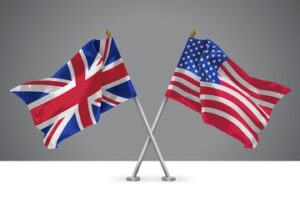
According to the results of a survey conducted by Active Group in collaboration with Experts Club in August 2025, Ukrainians identified priority areas for the development of foreign economic relations.
The majority of respondents – 81.3% – believe that Ukraine should first and foremost develop economic cooperation with the countries of the European Union. The United Kingdom also received a high level of support – 66.5%, while the United States came in third with 62.7%.
Citizens also pay significant attention to Asian countries: 36.2% of respondents support expanding relations with Southeast Asian countries (Japan, South Korea, etc.), and 31.7% with China. At the same time, 29.5% pointed to the importance of deepening cooperation with countries in the Arab and Muslim world.
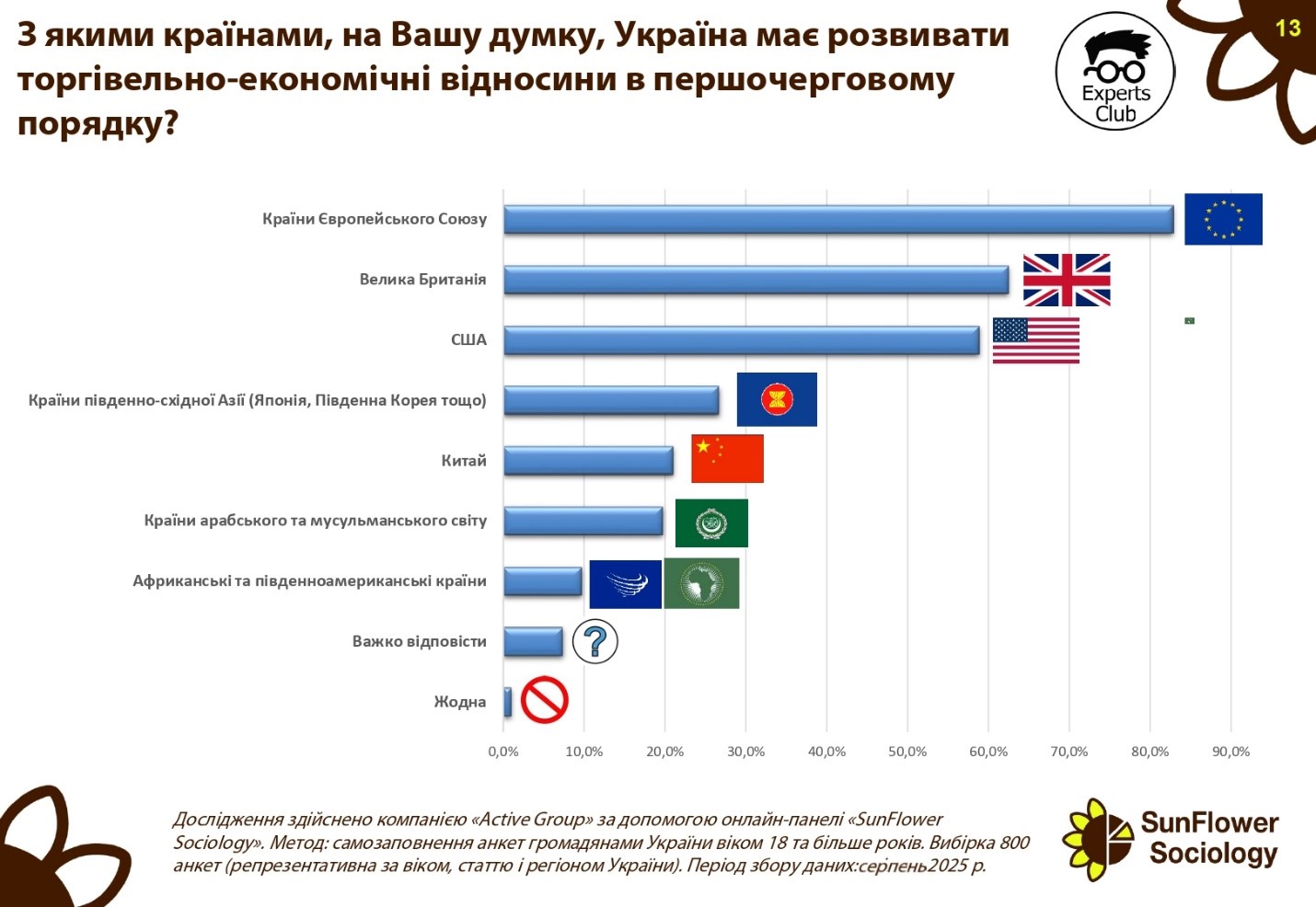
To a lesser extent, respondents are focused on partnerships with African and South American countries — this direction was supported by 14.8% of Ukrainians. Another 8.3% of respondents were undecided, and 1.0% believe that Ukraine does not need any new economic partnerships.
“These data clearly demonstrate the European and transatlantic orientation of Ukrainians in terms of economic priorities. The EU, the UK, and the US form the basis of foreign economic trust, while Asia and the Arab world are perceived as promising but secondary partners,” commented Active Group Director Oleksandr Pozniy.
According to Experts Club co-founder Maksim Urakin, the survey results confirm the real economic structure of Ukraine’s trade.
“The EU is already Ukraine’s main trading partner, accounting for over 40% of trade turnover, but if we analyze individual countries, China remains the leader. The high levels of support for cooperation with the UK and the US reflect society’s trust in Ukraine’s political and economic partners during this difficult period. At the same time, interest in Asia and the Arab world indicates the need to diversify markets and seek new opportunities in the future,” he stressed.
The survey was conducted using self-completed questionnaires among 800 Ukrainian citizens aged 18 and older. The sample is representative in terms of age, gender, and region.
ACTIVE GROUP, Arab countries, CHINA, EU, EXPERTS CLUB, GREAT BRITAIN, JAPAN, Pozniy, SOCIOLOGY, SOUTH KOREA, TRADE, UKRAINIAN ECONOMY, URAKIN, USA
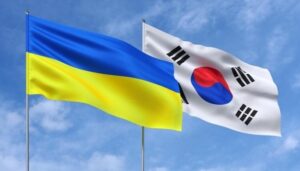
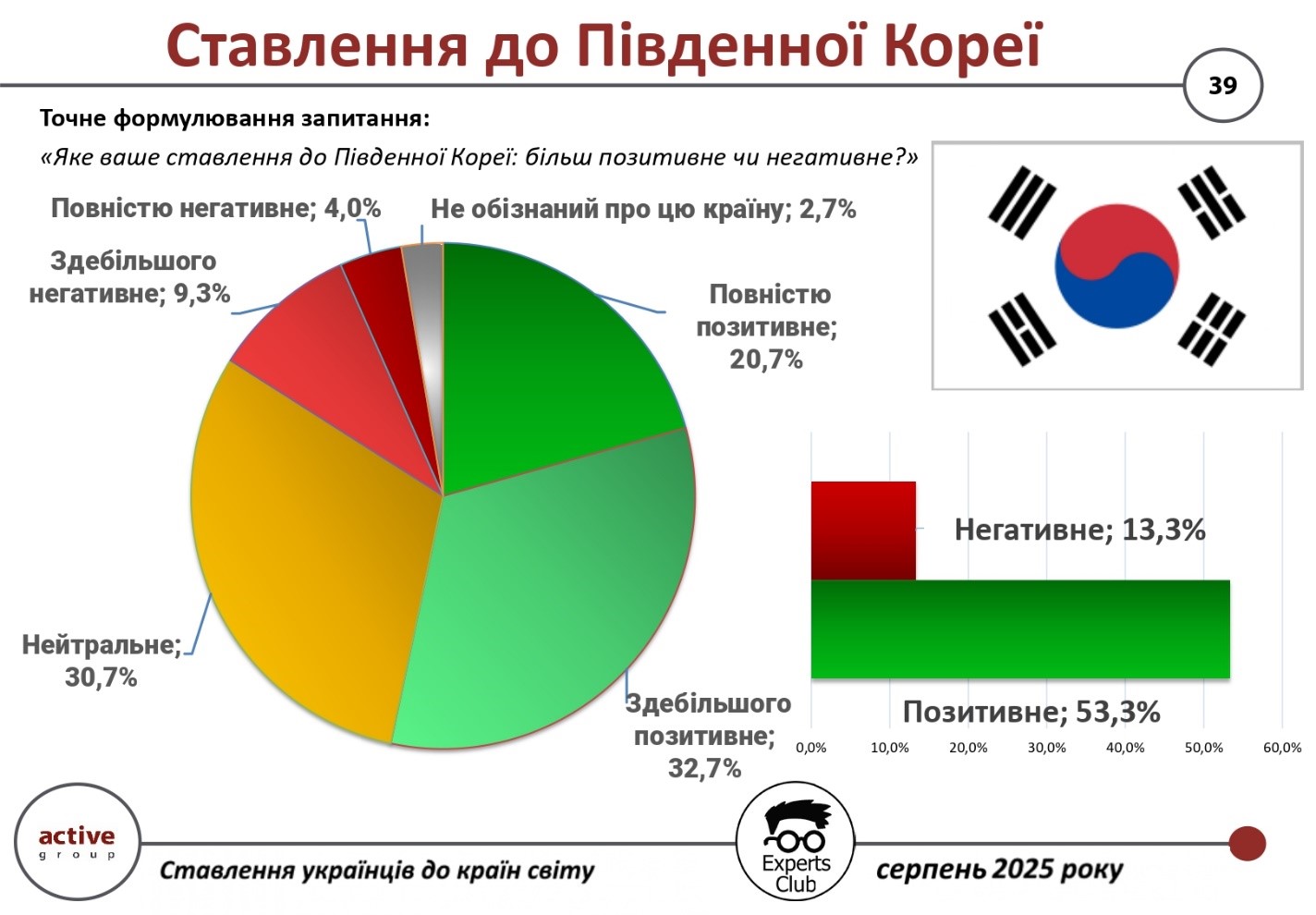
According to a survey conducted by Active Group in cooperation with Experts Club in August 2025, more than half of Ukrainians have a positive opinion of South Korea.
In total , 53.3% of respondents expressed favorable attitudes toward this country (32.7% – mostly positive, 20.7% – completely positive). A neutral attitude was recorded in 30.7% of respondents, and negative assessments amounted to 13.3%. Another 2.7% said they did not know enough about the country.
“South Korea is perceived by Ukrainians as a modern high-tech country that is developing dynamically and at the same time preserving its cultural identity. Ukrainians see it as a potential partner, especially in the field of technology, education, and innovation,” said Oleksandr Poznyi, CEO of Active Group.
At the same time, Maksym Urakin, co-founder of Experts Club, emphasized the economic dimension of bilateral relations:
“In the first half of 2025, the total trade turnover between Ukraine and the Republic of Korea amounted to more than $518 million. Exports of Ukrainian goods amounted to only $96.9 million, while imports amounted to more than $421 million. This resulted in a negative trade balance of $324 million. The situation demonstrates the need for more active promotion of Ukrainian goods to the Korean market, particularly in the agricultural and food sectors,” he emphasized.
The research is part of the systematic monitoring of Ukraine’s international relations and public opinion about its partners in the world.
The full video can be viewed here:
https://www.youtube.com/watch?v=YgC9TPnMoMI&t
You can subscribe to the Experts Club YouTube channel here:
https://www.youtube.com/@ExpertsClub
ACTIVE GROUP, EXPERTS CLUB, Poznyi, SOCIOLOGY, SOUTH KOREA, TRADE, UKRAINE, URAKIN
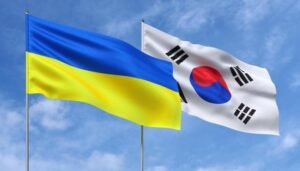
According to the results of a survey conducted by Active Group in collaboration with Experts Club in August 2025, more than half of Ukrainians have a positive opinion of South Korea.
In total, 53.3% of respondents expressed their favorability toward this country (32.7% — mostly positive, 20.7% — completely positive). A neutral attitude was recorded in 30.7% of respondents, while negative assessments accounted for 13.3%. Another 2.7% said they were not familiar enough with this country.
“South Korea is perceived by Ukrainians as a modern, high-tech country that is developing dynamically while preserving its cultural identity. Ukrainians see it as a potential partner, especially in the fields of technology, education, and innovation,” said Active Group CEO Oleksandr Pozniy.
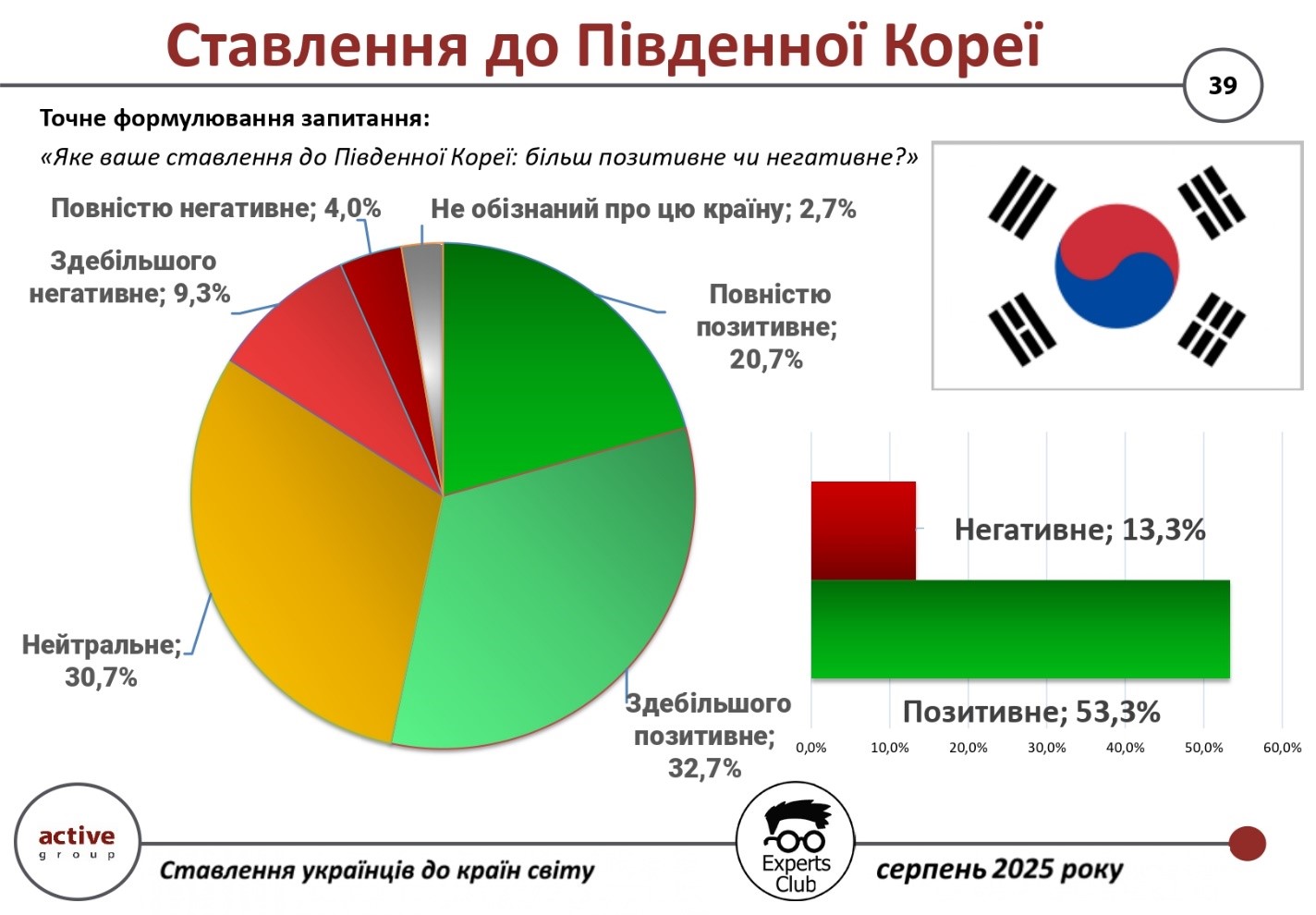
At the same time, Maksim Urakin, co-founder of Experts Club, emphasized the economic dimension of bilateral relations:
“At the end of the first half of 2025, the total trade turnover between Ukraine and the Republic of Korea amounted to more than $518 million. Exports of Ukrainian goods amounted to only $96.9 million, while imports exceeded $421 million.
This resulted in a negative trade balance of $324 million. The situation demonstrates the need for more active promotion of Ukrainian goods on the Korean market, particularly in the agricultural and food sectors,” he stressed.
The study is part of the systematic monitoring of Ukraine’s international relations and public opinion regarding its partners in the world.
The full video can be viewed at: https://www.youtube.com/watch?v=YgC9TPnMoMI&t
You can subscribe to the Experts Club YouTube channel here: https://www.youtube.com/@ExpertsClub
ACTIVE GROUP, EXPERTS CLUB, Pozniy, SOCIOLOGY, SOUTH KOREA, TRADE, UKRAINE, URAKIN
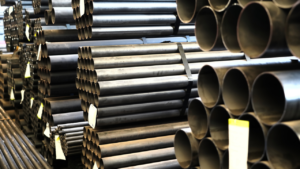
Centravis Production Ukraine (Nikopol, Dnipropetrovs’k region), a member of Centravis Ltd. holding, has agreed to supply a new batch of stainless steel pipes to South Korea for the largest hydrogen production plant.
According to a press release on Monday, Centravis has received an order for seamless pipes for a new hydrogen production plant in the South Korean city of Ulsan.
It is specified that the volume of delivery is 15 tons, and the client from South Korea ordered pipes for furnaces.
The company noted that Centravis has previously fulfilled orders for hydrogen projects. In particular, the Ukrainian company became a participant in a project to produce hydrogen-powered cars in the EU.
“Centravis has also agreed to supply seamless pipes from a German company specializing in hydraulic connections for the production of hydraulic connections with a high degree of leakage protection, in particular in projects using hydrogen and compressed natural gas.
“We are actively working in the Asian and Middle Eastern markets. And this contract is another step forward for us, especially since the construction of a hydrogen production plant has already become a landmark project for South Korea and the entire region,” said Artem Atanasov, Centravis Sales Director.
The construction of the Ulsan plant is expected to be completed in 2026. Its capacity will be 92,000 cubic meters per hour, or 8.2 tons. The volume of investments is about $157 million. It will be the largest hydrogen production plant in South Korea.
The press release states that Ulsan has become the center of the country’s hydrogen industry. Hyundai Motor and local authorities have recently agreed to create a hydrogen ecosystem in the city. In particular, the Korean automotive manufacturer presented a prototype of a hydrogen tram with a range of up to 150 km and a refueling time of up to 10 minutes.
The city recently unveiled the world’s first complex of “hydrogen apartments” that uses electricity and heat from hydrogen fuel cells, which provides significant savings in electricity costs.
As reported, in 2023, Centravis increased its production by 12% to 12.2 thousand tons. More than 98% of its products are supplied to foreign markets. The company has exported its products to 38 countries, including Germany, Italy, the USA, Japan, South Korea, the UAE, Oman, and others.
Today, Centravis is among the world’s ten largest producers of seamless stainless steel pipes.
“Founded in 2000, Centravis is one of the ten largest producers of seamless stainless steel pipes in the world. Its main production facilities are located in Nikopol (Dnipropetrovska oblast). In 2023, the company opened a branch in Uzhhorod.
Centravis Holding Ltd. was established on the basis of Nikopol Stainless Steel Pipe Plant CJSC, service and trading companies of Production and Commercial Enterprise YUVIS LLC. Its shareholders are members of the Atanasov family. Centravis Ltd. owns 100% of the shares of Centravis Production Ukraine.
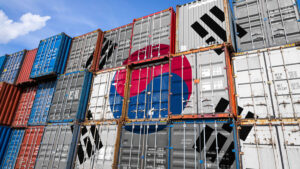
Kormotech, Ukraine’s largest producer of cat and dog food, has started exporting its products to the Korean market, the company’s press service told Interfax-Ukraine.
As specified in the report, since June 17, Kormotech’s Optimeal and Club 4 Paws brands have been presented on 12 Korean specialized Internet sites.
South Korea’s pet food market ranks third among East Asian countries, after China and Japan in East Asia. In terms of money, it is three times larger than the Ukrainian market. The share of sales of specialized food for cats and dogs is 50% to 50%.
“The South Korean market is unique in that 67% of petfood sales are made through online channels. This is the highest figure in the world, according to Euromonitor reports. Therefore, one of the challenges in cooperation with South Korea is to gain experience in building and developing online sales in the premium and super premium market,” said Eduard Babenko, Head of Strategic Business Unit Ukraine, Moldova and Southeast Asia at Kormotech.
Kormotech started negotiations with a distributor, Korean company Careside co. Ltd last year, and a cooperation agreement was signed in the fall. At the end of May 2024, the distributor received the first two containers of dry and wet food Optimeal and Club 4 Paws, which is about 24 tons of products.
You Young Kook, CEO of the Korean company Careside co. Ltd. expects that experience in international markets and resources will help the Ukrainian manufacturer to succeed in the South Korean market.
“Kormotech pet food contains high quality ingredients and undergoes rigorous quality control. This is a significant advantage, especially for demanding Korean pet owners. It is impressive to see how the company is constantly deepening its expertise in understanding the approaches to pet food formulation and their impact on the health and quality of life of pets. And most importantly, the efforts it makes to develop a culture of care and companionship with pets,” said You Young Kook.
According to Vladyslav Mazurkevych, Kormotech’s Asia Export Market Development Manager, super premium and premium cat and dog food lines are already available on the following 12 e-commerce sites in South Korea: Naver, Coupang, TM, WM, G-market, Auction, 11th St., Lotte On, Interpark, SSG, CJ on style, GS Shop.
“By the end of this year, we want to start cooperation with pet stores and veterinary clinics so that customers can look at the product, inspect it, and feel it,” Mazurkevych explained.
In 2023, Kormotech’s turnover increased by 22.5% to $152 million from $124 million in 2022. The ratio of sales abroad and in Ukraine in tons is now 31% to 69%, respectively (in 2022, it was 28% abroad and 72% in Ukraine).
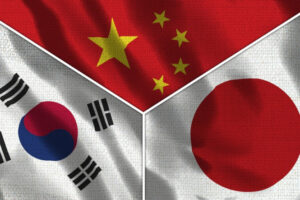
In the first trilateral meeting since 2019, the neighbors sought common ground on trade and cultural exchange while tiptoeing around thorny security issues.
The leaders of South Korea and Japan on Monday sought to restore economic cooperation with China, their largest trading partner, after years of deteriorating relations, but their trilateral talks were overshadowed by rising tensions between China and the United States, Seoul and Tokyo’s most important military ally.
The trilateral meeting, which was attended by South Korean President Yun Seok-yeol, Japanese Prime Minister Fumio Kishida, and Chinese Premier Li Keqiang, the second highest-ranking official, was the first in four and a half years.
The talks focused mainly on areas where it is easier to find common ground, such as protecting supply chains, facilitating trade, and cooperating to address aging populations and emerging infectious diseases. The leaders tiptoed around sensitive regional security issues such as Taiwan and North Korea.
“The three countries agreed to expand practical cooperation so that their peoples can experience its benefits,” Mr. Yun said during a joint press conference with Messrs. Kishida and Lee, declaring 2025 and 2026 “years of cultural exchanges” between the three countries.
But in the hours before the meeting, North Korea helped to emphasize the major differences between the three neighbors. Pyongyang announced that it would launch a long-range rocket within nine days to put a military spy satellite into space. United Nations Security Council resolutions prohibit the country from launching such missiles because they use the same technology needed to build intercontinental ballistic missiles.
North Korea’s increasingly aggressive military posture is a concern for South Korea and Japan. The North has also expanded its arms trade with Russia in defiance of UN sanctions, supplying artillery shells and missiles for Moscow’s military operations in Ukraine, according to US and South Korean officials. In response, Moscow has been accused of providing energy and technological assistance that could contribute to North Korea’s missile program.
South Korea and Japan have called on China, North Korea’s biggest benefactor, to use its economic clout to help curb Pyongyang’s nuclear and missile programs. Until now, Beijing has been reluctant to use this leverage, viewing North Korea as a buffer against the U.S. military on the Korean Peninsula.
On Monday, both Mr. Yun and Mr. Kishida sharply criticized the North Korean plan to launch the satellite. But Mr. Li, who serves under Xi Jinping, China’s top leader, did not condemn North Korea, but merely called on all sides to “exercise restraint” and work toward a “political settlement.”
As the press conference in Seoul was winding down, 20 South Korean warplanes conducted air drills south of the inter-Korean border as a warning of “immediate and strong” retaliation for North Korea’s provocation.
China, Japan and South Korea have agreed to hold a trilateral meeting every year since 2008 to discuss regional cooperation. But the plan has often been disrupted by diplomatic disputes, and most recently by the pandemic. Monday’s meeting in Seoul was the ninth such meeting and the first since December 2019.
During the years-long hiatus, strategic competition between Washington and Beijing has intensified, which has also deteriorated relations between China and the two US allies. China has flexed its military muscle and expanded its territorial ambitions in the South China and East China Seas, while the United States, Japan, and South Korea have increased the number of joint military exercises and strengthened missile defense and other security cooperation.
China’s ties with the two U.S. allies have become so strained in recent years that analysts say the revival of the trilateral summit is an achievement in itself. But common interests compelled Beijing and its two neighbors to revive it.
Mr. Yun said on Monday that the three countries had agreed to hold regular summit meetings.
East Asia’s neighboring countries, which together account for more than a fifth of global economic output, need regional stability and cooperation, especially in supply chains, to recover from the post-pandemic economic downturn. While Japan and South Korea consider the United States their most important ally, hosting 80,000 U.S. troops, their leaders face pressure at home from businesses competing for better access to China.
China is betting that it can appease Japan and South Korea by offering them greater access to its market and reducing Washington’s influence. To this end, China has agreed to resume negotiations on a free trade agreement between the three neighbors, emphasizing increased economic cooperation as a means of maintaining regional peace and stability.
He portrayed the United States as meddling in Asian affairs, pressuring Japan and South Korea to form a bloc to curb China’s development. Washington has built a wall of restrictions to deny Beijing access to the latest semiconductors and is calling on allies such as Japan and South Korea to cooperate.
On Monday, Mr. Li indirectly criticized Washington, calling for a “multipolar” world order and opposing any attempts to create “blocs” and “politicize” trade issues.
In recent years, Japan and South Korea have grown closer, improving relations that have long been strained by historical disputes. They have also expanded trilateral military cooperation with the United States to deter North Korea and China.
Japan and South Korea have called on China to address concerns about the difficulties of doing business in China. Mr. Kishida called for the speedy release of Japanese citizens detained in China on suspicion of espionage.
During bilateral talks on Sunday, South Korea and China agreed to establish new channels to discuss security and supply chain cooperation, said Kim Tae-hyo, deputy director of national security in Mr. Yoon’s office.
Mr. Yoon’s policy of bringing South Korea closer to the United States has coincided with a sharp drop in South Korean exports to China. According to government data, this year the United States overtook China as South Korea’s largest export market for the first time in two decades.
Source: https://www.nytimes.com/2024/05/27/world/asia/china-japan-korea-trilateral.html